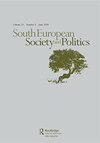Looking for Affective Polarisation in Spain: PSOE and Podemos from Conflict to Coalition
IF 4.6
1区 社会学
Q1 POLITICAL SCIENCE
引用次数: 14
Abstract
ABSTRACT Voters in many advanced democracies increasingly dislike their political opponents, a phenomenon that is known as affective polarisation. The growing animosity between electorates is particularly challenging in multiparty systems, where ruling is more dependent on cross-party alliances. In this work, we examine the case of Spain, a multiparty democracy that exhibits one of the highest levels of affective polarisation among advanced democracies. Using public opinion databases as well as extensive qualitative evidence, we operationalise and explore the evolution of affective polarisation in the Spanish electorate and its main drivers, with a particular focus on the competition for the left–wing electorate between the PSOE and Podemos during the 2015–2020 period.寻找西班牙的情感两极分化:PSOE和Podemos从冲突到联合
许多发达民主国家的选民越来越不喜欢他们的政治对手,这种现象被称为情感两极分化。在多党制国家,执政更依赖于跨党派联盟,选民之间日益增长的敌意尤其具有挑战性。在这项工作中,我们研究了西班牙的情况,这是一个多党制民主国家,在发达民主国家中表现出最高水平的情感两极分化。利用民意数据库以及广泛的定性证据,我们操作并探索了西班牙选民中情感两极分化的演变及其主要驱动因素,特别关注2015-2020年期间社会主义工人党(PSOE)和我们可以党(Podemos)之间对左翼选民的竞争。
本文章由计算机程序翻译,如有差异,请以英文原文为准。
求助全文
约1分钟内获得全文
求助全文
来源期刊

South European Society and Politics
Multiple-
CiteScore
5.80
自引率
21.20%
发文量
14
期刊介绍:
A leading point of reference for scholars of Southern Europe, South European Society and Politics promotes both comparative and inter-disciplinary analyses, as well as offering innovative single county and sub-national studies. The journal acts as a forum for social, economic, cultural, contemporary historical and political approaches to research on the region, and is particularly keen to sponsor policy–focused studies in all these disciplines. The journal publishes research articles; South European Atlas with election reports and articles on other subjects of topical interest, and an extensive book reviews section, including both review articles and individual book reviews.
 求助内容:
求助内容: 应助结果提醒方式:
应助结果提醒方式:


